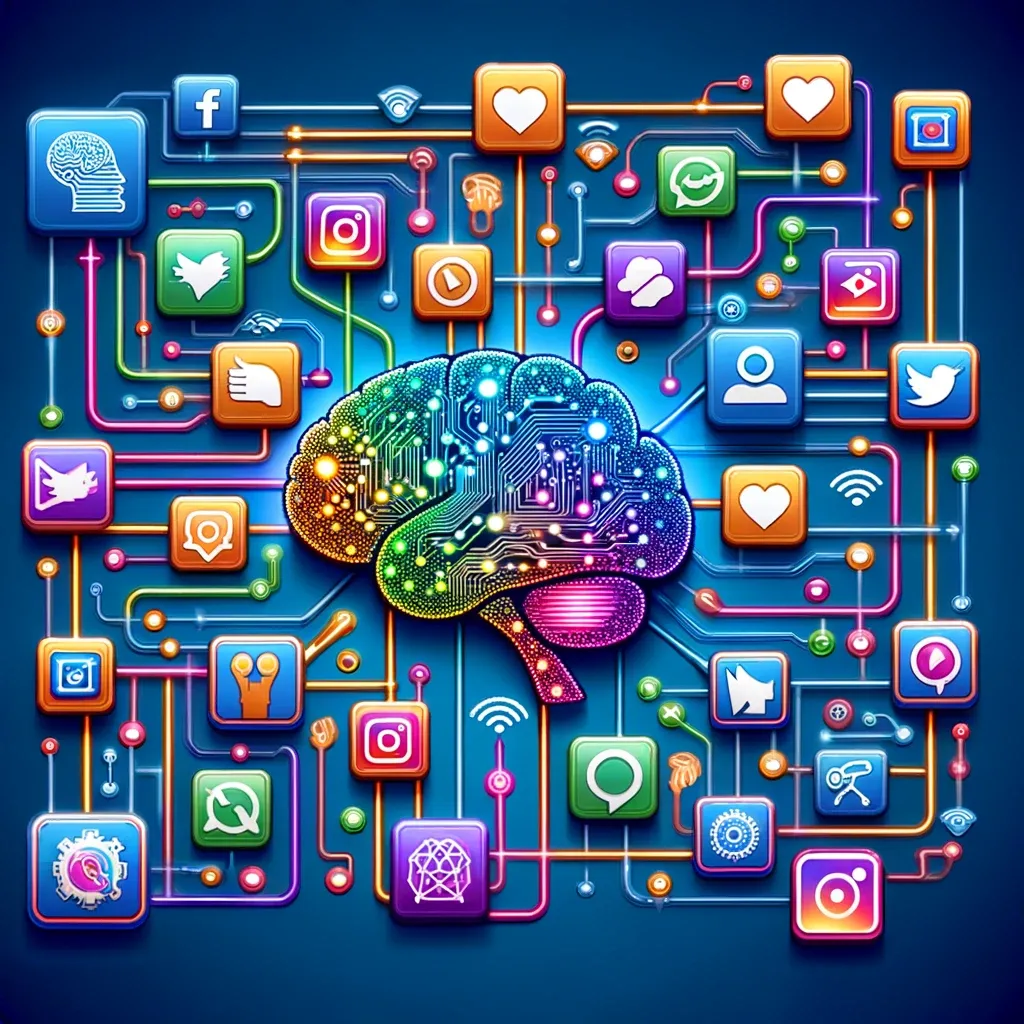Enhancing ROI with AI: The Future of Marketing Strategies
In the rapidly evolving landscape of digital marketing, Artificial Intelligence (AI) emerges as a game-changer, revolutionizing how businesses engage with customers, analyze data, and ultimately, boost their Return on Investment (ROI).
As we delve into the intricate world of AI marketing strategies, it's essential to understand the monumental role AI plays in not just complementing traditional marketing efforts but significantly enhancing ROI.
This comprehensive exploration will guide you through the critical aspects of evaluating, setting up, and benefiting from AI-driven marketing campaigns, paving the way for a future where AI is at the heart of marketing success.

Evaluating AI Marketing Strategy Effectiveness
Before diving headfirst into AI marketing, it's crucial to assess the effectiveness of such strategies. This evaluation hinges on specific methodologies, tools, and metrics that collectively offer insights into the performance and ROI of AI-driven initiatives.
Key Methodologies and Tools
- Data Analytics Platforms: Utilizing advanced analytics platforms enables marketers to sift through vast datasets, identifying patterns and insights that drive strategic decisions.
- A/B Testing Tools: By comparing different AI-driven strategies, A/B testing allows for a granular analysis of what works best in engaging customers and driving conversions.
- ROI Calculation Models: These models help quantify the financial impact of AI marketing strategies, offering a clear picture of their value in enhancing marketing ROI.
Essential Metrics for Assessment
- Customer Acquisition Cost (CAC): AI can optimize marketing spend, reducing the cost per acquisition and improving overall ROI.
- Customer Lifetime Value (CLTV): AI's predictive capabilities forecast customer behavior, aiding in strategies that maximize lifetime value.
- Conversion Rates: AI enhances personalization, leading to higher conversion rates from targeted marketing campaigns.
Setting Up an AI-Driven Marketing Campaign
The journey towards implementing an AI-driven marketing campaign involves several pivotal steps, each contributing to the campaign's success.
Selection of Technologies
Choosing the right AI technologies is foundational. Whether it's machine learning algorithms for predictive analytics, natural language processing for customer service chatbots, or AI-powered content creation tools, the selection must align with specific marketing objectives.
Data Analysis Techniques
Leveraging AI for data analysis involves:
- Predictive Analytics: Forecasting future trends based on historical data to tailor marketing strategies.
- Customer Segmentation: Utilizing AI to segment customers more accurately, enabling highly targeted marketing efforts.
- Sentiment Analysis: Gauging customer sentiment through AI to adjust marketing messages accordingly.
Integration into Existing Marketing Frameworks
Seamlessly integrating AI tools into current marketing workflows is crucial. This integration involves training teams, setting up data pipelines, and ensuring AI tools complement and enhance existing strategies without causing disruption.
Case Studies
Case Study 1: Retail Transformation with Personalized Recommendations
Background: A leading retail giant, facing stiff competition in the e-commerce space, sought to enhance customer engagement and increase sales through personalized marketing. The company decided to implement AI-driven personalized recommendation systems to curate and offer products tailored to individual customer preferences.
Implementation: The company integrated AI algorithms into their online platform, analyzing customer data, including past purchases, browsing behavior, and search history. The AI system used this data to predict and suggest products that customers are likely to be interested in. Additionally, AI was employed to optimize email marketing campaigns, sending personalized product recommendations and offers to individual customers.
Outcome: Within six months of implementing AI-driven personalized recommendations, the company observed a 30% increase in customer engagement as measured by time spent on the website and interaction rates. The targeted email campaigns achieved a 25% higher open rate and a 40% increase in click-through rates, leading to a significant boost in sales. Overall, the ROI from marketing expenditures improved by 45%, proving the effectiveness of AI in enhancing customer experience and driving sales.
Case Study 2: Online Publisher's Ad Revenue Growth
Background: An established online publisher was looking to increase its ad revenue and subscription rates in a market where user attention is increasingly fragmented. The goal was to optimize ad placements and content delivery to improve user engagement and subscription conversions.
Implementation: The publisher deployed AI algorithms to analyze user engagement patterns across various types of content and ad placements. This analysis enabled the creation of a dynamic content delivery system that personalized the user experience, presenting the most relevant content and strategically placed ads based on user behavior and preferences. Additionally, AI-powered tools were used to optimize headlines and content for search engines, improving visibility and driving organic traffic.
Outcome: The adoption of AI-driven optimization led to a 20% growth in ad revenue within the first year, attributed to higher engagement rates and more effective ad placements. Subscription rates saw a 15% increase, bolstered by personalized content recommendations that improved user satisfaction and retention. The publisher also noted a 35% increase in organic traffic due to better search engine rankings, further contributing to the overall improvement in ROI from their marketing efforts.
Emerging Trends and Their ROI Implications
Looking ahead, several trends promise to further revolutionize AI marketing and its impact on ROI.
- Voice and Visual Search Optimization: As voice and visual searches become more prevalent, AI's role in optimizing for these new search methods will be crucial in capturing early adopter benefits.
- AI-Driven Content Creation: Advanced AI tools are beginning to produce high-quality, engaging content, reducing costs and improving content marketing ROI.
- Predictive Customer Behavior Modeling: With improvements in AI, predicting customer behavior with greater accuracy will allow for more efficient use of marketing budgets and higher ROI.

The Path Forward
The potential of AI in marketing is boundless, offering unprecedented opportunities for ROI improvement. By embracing AI, marketers can unlock new levels of personalization, efficiency, and insight, leading to more effective and profitable marketing strategies. However, success requires continuous evaluation and adaptation, ensuring that AI tools and strategies remain aligned with changing market dynamics and consumer behaviors.
Embracing AI in marketing is not just about adopting new technologies; it's about transforming the approach to marketing itself. As we look to the future, the integration of AI into marketing strategies will become not just an advantage but a necessity for those looking to stay ahead in the competitive digital landscape.





